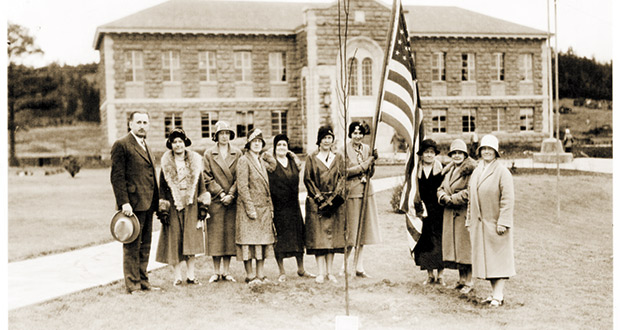Frank Barrios, World War II
This photo shows a residential part of downtown Phoenix as it was in 1945, when even very fine homes had chickens in the back yard.
The Washington Elm
On a rainy Wednesday, April 22, 1931, members of the Coconino Chapter of Daughters of the American Revolution gathered together with Dr. Grady Gammage, president of Arizona State College (now Northern Arizona University) to plant an elm tree in honor of the bicentennial of George Washington’s birth.
Irene Vickrey, Arizona’s Unsung Archaeologist
Though incredibly important to Arizona archaeology in her day, Irene Singleton Vickrey’s productive but brief career is known only to a handful of historians and archaeologists.
Murder at Ruby
In the 1870s, Jack Smith discovered rich ore reserves of silver, gold, lead, zinc and copper at the Montana Mine located in Ruby, Ariz. The Ruby town site is located in southern Arizona, roughly halfway between Tubac and Sasabe. Julius Andrews operated the general store near the mine for 18 years and became the area’s first postmaster. He named the post office in honor of his wife, Lillie B. Rub[...]
The Getaway Train
It all started when Thomas Hart, a drifter with a penchant for alcohol, stole a case of whiskey from Paul Moretti’s saloon. Moretti reported the theft to Yuma County Sheriff Gus Livingston. Not long after, Moretti spotted Hart on Main Street and pointed him out to a young deputy, Matt DeVanem, who confronted Hart and tried to arrest him. Hart shot the deputy at point blank range with a gun hidde[...]
Tombstone’s deadliest gunfighter
John Peters Ringo — famously known as Johnny Ringo and dubbed Tombstone’s deadliest gunfighter — first turned up in Arizona at a bar in Safford in 1878, where he offered a whiskey to a man seated next to him. The unarmed man declined and said he preferred beer. Ringo then drew his pistol and fired, nicking the man’s ear. When the case came before a grand jury, Ringo did not appear.
Central Avenue grows up
Pioneer developer William J. Murphy planted the ash trees that originally lined Central Avenue As he developed subdivisions across the Valley, he also built his own home for north of the Phoenix city limits on Central Avenue in the Orangewood subdivision.
Thomas Farish: State Historian
Unlike today, where the state historian is an honorary position created by a governor’s proclamation, in late territorial and early statehood days, this was an official, paid government position.
Losing their clout: Four of Arizona’s five Cs not what they used to be
Arizona’s famous five Cs have been used as a quick way to describe the economic engines that drive the state. Representations of copper, cattle, climate, cotton and citrus are all emblazoned on the Great Seal of the state of Arizona, although these industries are not the forces they once were.
The New Mills House
Susie and Ernest Mills came to Arizona in 1881. Ernest was a Canadian who ran away from home to join the American Civil War. He served three years with an Ohio regiment and was wounded in battle. After the war, he settled in Kansas, married Susie and worked in a variety of governmental jobs — U.S. marshal, county coroner and justice of the peace.
Times Past: Bob Burgunder, student murderer
As former Arizona State Teachers College student Bob Burgunder, Jr., sat on death row in Florence, he commented, “There’s too much free speech in this country. I think there’s too much education, too. I think we should stop educating the masses and educate only a few intelligent people.”
Marvel Crosson and the Powder Puff Derby
Women had been flying airplanes since the early days of aviation, and by 1928, they had also piloted balloons, parachuted out of disabled planes, served as their own mechanics, set altitude and speed records, wing-walked and barnstormed. But they hadn't yet raced airplanes.









